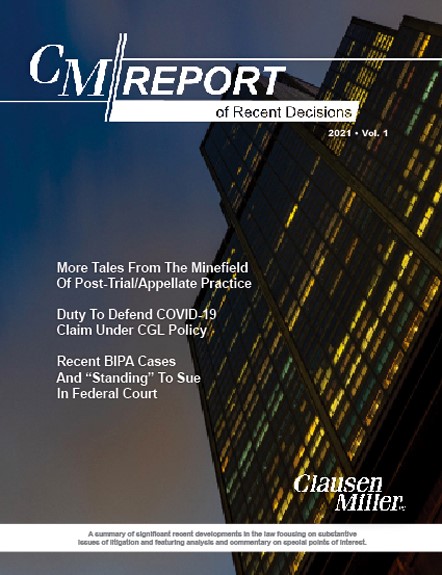CM Report of Recent Decisions – 2021 Volume 1

More Tales From The Minefield Of Post-Trial/Appellate Practice: Omega SA v. 375 Canal, LLC, 984 F.3d 244 (2nd Cir. 2021)
During this Sidebar author’s nearly 30 years of post-trial and appellate practice, she has guided her work for her clients according to one steadfast rule—always use “belts and suspenders” when it comes to preserving errors and insuring appellate jurisdiction. In one past appeal, four separate notices of appeal were filed in the same case because of uncertainties regarding the finality of the actual final order—and the appellate court accepted all four as properly filed to establish appellate jurisdiction. This recent decision by the United States Court of Appeals for the Second Circuit again illustrates the wisdom of always using “belts and suspenders” in navigating the minefield of post-trial/appellate practice and preserving errors for appeal.
Update: Florida Enacts New Law Modifying Appellate Jurisdiction Over County Court Appeals
Clausen Miller’s Technology & Cyber Group provides the following update to keep you informed on recent important cases adjudicating Illinois’ Biometric Information Privacy Act (“BIPA”). BIPA regulates the collection, use, safeguarding, handling, storage, retention, and destruction of individuals’ biometric information, such as fingerprints.
Update: Recent BIPA Cases And “Standing” To Sue In Federal Court
Clausen Miller’s Technology & Cyber Group provides the following update to keep you informed on recent important cases adjudicating Illinois’ Biometric Information Privacy Act (“BIPA”). BIPA regulates the collection, use, safeguarding, handling, storage, retention, and destruction of individuals’ biometric information, such as fingerprints.
Florida Supreme Court: Extracontractual Damages Not Recoverable In Florida First-Party Property Policy Claim Litigation Absent Policyholder Compliance With Florida’s Civil Remedy Notice (CRN) Statute
On January 21, 2021, the Florida Supreme Court decided in the negative the following certified question:
In a first-party breach of insurance contract action brought by an insured against its insurer, not involving [bad faith] under section 624.155, Florida Statues, does Florida law allow the insured to recover extra-contractual, consequential damages?
Eleventh Circuit Upholds Summary Judgment For Insurer Citing Doctrine Of Uberrimae Fidei
The legal doctrine of uberrimae fidei literally means “utmost good faith”. This term is common in the insurance industry as the insurance policy, which is a legal contract, is said to be executed in utmost good faith. This means that all parties to an insurance contract must deal in good faith, making a full declaration of all material facts in the insurance proposal.
Burden On Insureds To Prove Exception To Exclusion In Property Policy
A common and near-universal rule of insurance coverage is that the insured has the burden of proving that a claim or loss falls within the scope of a policy’s insuring agreement, while the insurer has the burden of establishing the applicability of a policy’s exclusion from coverage. If the exclusion in question contains an exception, the question then arises of whose burden it is to prove that the exception applies. The question is not a new one in many jurisdictions. A recent appellate court decision, however, appears to have decided for the first time in Illinois that the burden falls on the insured.
Florida Court of Appeals Dismisses Bad Faith Lawsuit For Failure To Comply With The Civil Remedy Notice Specificity Requirements
In Florida, a policyholder may not assert a statutory bad faith lawsuit against its Insurer under § 624.155, Fla. Stat. without first filing a Civil Remedy Notice (“CRN”) with the Florida Department of Financial Services (the “Department”). To comply with the statute’s requirements, the CRN must include specified information with specificity.
Florida Courts: Insurer’s Request For Appraisal Does Not Toll Civil Remedy Notice Cure Period
Florida’s Fourth District Court of Appeals joined other Florida appellate courts in determining that a bad faith action cannot be dismissed on the grounds that appraisal was awarded and paid because the insurer’s request for appraisal did not toll the 60-day cure period reflected in §624.155 of Florida Statutes for a Civil Remedy Notice (“CRN”). Zaleski v. State Farm Fla. Ins. Co., No. 4D19-2478, 2021 LEXIS 2712 (Fla. 4th DCA, 2021).
First Take: Duty To Defend COVID-19 Claim Under CGL Policy
On February 22, 2021, the U.S. District Court for the Northern District of Illinois held that a commercial general liability (“CGL”) insurer has a duty to defend McDonald’s against claims brought by employees allegedly exposed to coronavirus on the job. This is the first finding of a duty to defend a COVID-19 claim in the third-party liability context.
Coming Attractions: Florida Changes Its Summary Judgment Standard
Back when we could still go to movies, getting there early was advisable. It allowed time to get popcorn, candy, a drink, and then find a good seat before the previews started. Hollywood’s teasers, previews let us know what’s heading our way.
Change Of Course: Massachusetts Adopts But-For Causation—Mostly
More than two things—death and taxes—are certain in life. There’s at least a third certainty: the law’s uncertainty about the proper standard governing proximate causation in tort cases. The concept creates confusion wherever it goes. It has mystified commentators, judges, and litigators for decades. It has now changed how the Restatement of Torts views the issue. That’s significant because the Restatement has strongly influenced states in formulating their standards. States like Massachusetts, which recently jumped on board the Restatement’s updated approach. Doull v. Foster, 2021 Mass. LEXIS 145.
 Melinda S. Kollross
Melinda S. Kollross Joseph J. Ferrini
Joseph J. Ferrini Private: Edward M. Kay
Private: Edward M. Kay Benjamin S. Burnstine
Benjamin S. Burnstine Brian J. Riordan
Brian J. Riordan Private: Mindy M. Medley
Private: Mindy M. Medley Private: Alexander J. Brinson
Private: Alexander J. Brinson Private: Anne E. Kevlin
Private: Anne E. Kevlin Private: Michele T. Bachoon
Private: Michele T. Bachoon Don R. Sampen
Don R. Sampen Private: Michael H. Scott
Private: Michael H. Scott Private: Anna P. Jimenez
Private: Anna P. Jimenez Amy R. Paulus
Amy R. Paulus Paul V. Esposito
Paul V. Esposito